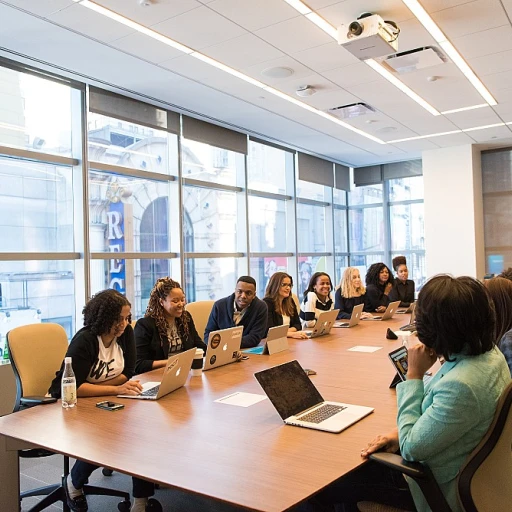
Understanding the Importance of Employee Appreciation
The Power of Appreciation in Strengthening Employee Relations
Employee appreciation is not merely a feel-good initiative; it's a crucial element in fostering a productive and engaging work environment. Acknowledging the hard work and dedication of your team members can significantly impact their sense of value, enhancing both employee recognition and morale.
In today's competitive job market, it's essential for companies to cultivate a culture where employees feel appreciated. When employees perceive that their efforts are recognized and valued, they are more motivated to contribute positively to the company. This sense of engagement not only boosts individual productivity but also enhances team cohesion, creating an atmosphere where innovation and collaboration can thrive.
An appreciation culture can be woven into the fabric of a company in many creative ways. From personalized appreciation gifts to structured recognition programs, there are numerous methods to ensure that staff feel valued. The simplest shows of gratitude, such as a sincere thank you or an appreciation day celebration, can have profound effects. It's about being genuine and timely with your recognition to make employees feel truly appreciated.
Setting aside time to celebrate the contributions of each team member nurtures a sense of belonging and community. Whether through an appreciation week filled with fun activities or providing a special gift card on a Friday in March, the goal is to create memorable experiences that fortify team spirit. By consistently applying innovative appreciation ideas, a company can achieve greater employee engagement and retention.
Innovative Employee Appreciation Themes
Unique Themes for Recognizing Employee Efforts
When it comes to showing appreciation to employees, thinking outside the box can lead to memorable and motivating experiences. Unique and innovative appreciation themes can effectively make employees feel valued and appreciated. These creative approaches not only boost morale but also reinforce a positive company culture where everyone feels recognized for their hard work.
Consider running an "Appreciation Week" filled with diverse activities tailored to different teams or departments. You might incorporate a "Gratitude Day" where employees can express their thanks in a fun and interactive manner. Perhaps introduce a "Theme Day" that aligns with the company values, allowing team members to showcase their talents and team spirit.
Another engaging idea is a "Appreciation Scavenger Hunt" where staff can participate in work-related challenges and be rewarded with small appreciation gifts. An Appreciation Wall where employees post words of encouragement or recognition is another way to fill a workspace with positivity.
Don't overlook the power of gift cards. Offering team members choice through a curated selection of gift ideas can go a long way to make them feel appreciated. Personalization is key; acknowledging individual contributions makes employees feel their input is distinct and valued.
Finally, celebrating career milestones, like an "Eight Year Milestone Celebration" for dedicated employees, can highlight the importance of long-term commitment. Recognizing these significant achievements can significantly boost employee engagement and loyalty. For more on celebrating career milestones, check out this resource.
These innovative approaches can powerfully contribute to a culture where employee appreciation isn’t just a day-to-day activity but an ingrained element of workplace engagement.
Implementing Appreciation Programs
Practical Steps to Establishing Appreciation Programs
Creating an effective employee appreciation program involves careful planning and a deep understanding of your team’s unique needs and preferences. When you recognize the hard work and commitment shown on a daily basis, employees feel valued and morale receives a considerable boost. Building such programs can be rewarding not only for the team but also for the organization as a whole.
First, it’s crucial to fill your schedule with consistent recognition opportunities. A regular appreciation day or even an appreciation week can ensure employees are regularly reminded of their importance to the company. Align these days strategically throughout the year to maintain a high level of engagement.
Here are a few practical ideas to implement:
- Organize an employee appreciation day with fun activities, such as team-building exercises or a company lunch. This helps to foster a stronger team culture.
- Gift ideas such as personalized gifts or a thoughtful letter can go a long way in showing gratitude.
- Distribute recognition rewards like gift cards; these offer tangible ways to show appreciation.
- Use innovative approaches by setting unique themes for each appreciation event, adding an element of surprise and anticipation.
Incorporating these practices into the work culture doesn't just make employees feel appreciated but also stimulates a positive environment that nurtures creativity and productivity. Remember, for these initiatives to be effective, they must be consistently practiced and fine-tuned to meet the changing dynamics of your workforce.
Taking a methodical approach to crafting the perfect welcome email for new hires (crafting the perfect welcome email for new hires) is also vital in reinforcing an appreciation culture from day one. This sets the tone for new team members to feel valued and integrated immediately into the company’s mission.
Measuring the Impact of Appreciation Initiatives
Assessing How Employee Appreciation Influences Engagement
Understanding the effects of appreciation initiatives is crucial for their continued success and improvement. Employee appreciation programs have the potential to significantly enhance engagement, boost morale, and make employees feel valued and appreciated. Here’s how companies can measure the impact of these programs:- Gather Feedback: Regularly seek feedback from team members to gauge how appreciation initiatives are received. Surveys, suggestion boxes, or face-to-face meetings can serve as effective methods. Pay special attention to recurring appreciation ideas and suggestions for improvement.
- Monitor Retention Rates: A direct correlation often exists between employee recognition programs and retention rates. If your company experiences lower turnover after launching an appreciation program, it may indicate a positive impact on staff morale and engagement.
- Analyze Employee Performance: Keeping a tab on productivity and performance metrics can help determine the effectiveness of your recognition rewards. An increase in performance could indicate that appreciation efforts me recognize and reward hard work are yielding good results.
- Utilize Engagement Surveys: Conduct regular engagement surveys to measure shifts in how appreciated employees feel. Questions could revolve around how frequently they receive recognition and how these gestures impact their enthusiasm and day-to-day work.
- Track Participation in Appreciation Events: Measuring participation rates in events like appreciation day or appreciation week can provide insights into the levels of enthusiasm and involvement within the team.
Overcoming Challenges in Employee Appreciation
Addressing Common Hurdles in Employee Appreciation
Creating impactful employee appreciation programs can be both rewarding and challenging. One of the primary obstacles is ensuring that appreciation feels genuine rather than obligatory. Employees can easily perceive when recognition is insincere, which may lead to decreased morale rather than a sense of being valued. Here’s how to navigate such challenges:
- Time Constraints: With the pressures of daily work, finding time for meaningful recognition can be difficult. Scheduling regular appreciation activities, like a monthly appreciation day or appreciation week, can help integrate recognition into the company culture.
- Budget Limitations: While grand gestures may seem necessary, simple actions can also make employees feel appreciated. Handwritten notes, verbal praise during meetings, or small appreciation gifts such as a gift card can go a long way in recognizing hard work.
- Diverse Employee Preferences: Not all employees feel valued by the same gestures. Offering a variety of recognition rewards and fill-able forms for employees to express their preferences will help tailor appreciation efforts effectively. It ensures that every team member has the chance to feel appreciated in a way that resonates with them.
- Maintaining Momentum: Over time, appreciation initiatives can lose momentum if not continually refreshed. Introducing new ideas or themes, like 'fun friday' activities or team-building days, helps sustain interest and enthusiasm.
- Consistent Communication: Continuous engagement with the team is essential. Acknowledging achievements during regular meetings and ensuring leaders communicate appreciation regularly helps create a positive environment where gratitude is a part of the daily work culture.
Successfully overcoming these challenges ensures that employee recognition remains a vital aspect of workplace culture, contributing to higher employee engagement and more fulfilled, productive teams.













